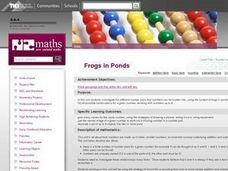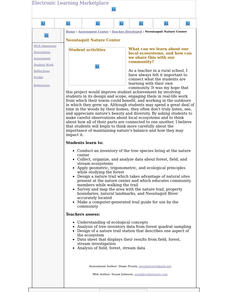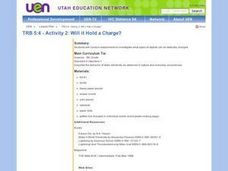Curated OER
Comparing Two Books
Second graders compare and contrast The Hat and Animals Should Definitely Not Wear Clothes. In this connections lesson plan, 2nd graders read two books and discuss their similarities and differences.
Curated OER
Othello
Students find evidence to support reasons why Othello's insecurity makes him weak. In this Othello analysis activity, students find evidence to support Othello as a strong person at the beginning of the play. Students use the given...
Curated OER
Computer Violence Debate
Students debate whether playing violent computer games desensitizes people to real-life violence.
Curated OER
A WebQuest about Ocean
Fifth graders explore the realm of an ocean through an ocean WebQuest. The Problem Based Learning Theory is used within this lesson. They complete several activities on the different concepts of oceans. Students are challenged to solve...
Curated OER
Election Day Lesson: The True Story of the Three Little Pigs
Students read the story, The True Story Of The 3 Little Pigs and discuss the voting process. In this public opinion lesson plan, students review the original story of the three little pigs and then read the wolf's version of the...
Curated OER
Television: Comedy Vs. Drama
Young scholars investigate the world of Television by contrasting specific programs. In this visual storytelling lesson, students compare and contrast the differences between comedy and drama by making a Venn Diagram. Young...
Curated OER
On Becoming Husbands/Wives/Mothers/Fathers
High schoolers are introduced to becoming wives, husbands, mothers and fathers. In groups, they define what love means to them and discuss why they believe many people are rushing to marriage and parenthood. To end the lesson, they...
Curated OER
Purim, Jewish Leaders, And The Roles We Choose
Students participate in the Jewish holiday of Purim. They are concerned with the idea of changing an identity for one day. The focus of this study is upon leadership as the students role play different leaders and make decisions to model...
Curated OER
Home Sweet Home
Students examine the change in the diversity of animals living in an area before and after development. In order to do this, students need to have access to an area near their school which is undeveloped. A good, "real life" lesson.
Curated OER
Preserving and Promoting Democracy
Eleventh graders create surveys to determine whether or not young people have or plan to vote. Using their findings, 11th graders make advertisements aimed at encouraging youth to vote.
Curated OER
ESL Holiday Lessons: National Jelly Bean Day
In this language skills worksheet, students read an article about National Jelly Bean Day. Students respond to 6 matching questions, 29 fill in the blank questions, 30 multiple choice questions, 12 word scramble questions, 30...
Curated OER
Frogs in Ponds
First graders determine how numbers are made up of other smaller numbers before examining addition and subtraction. They determine the number pairs that make up a given number and determine when no other pairs can be found. They use frog...
Curated OER
"Mysteries"
In this reading comprehension worksheet, learners read a short piece of text entitled "Mysteries" and answer five reading comprehension multiple choice questions.
Curated OER
"Be the Kiwi"- Whale Rider
Students discuss examples of foreshadowing and find information about the Maori culture in Whale Rider. For this Whale Rider lesson, students define foreshadowing and find examples. Students evaluate whether or...
Lycoming College
An Author Study of Jan Brett
Jan Brett, the author of many beloved children's books, is well worth a study. Try out this winter-themed unit, which covers areas of language arts as well as art, math, science, and social studies.
Curated OER
Creature Creation
Second graders listen to a read aloud of a fictional story about a frog. They compare the characteristics of the main character with a real frog. They work with two partners to create a creature; one student draw the head, one the body,...
Curated OER
Inventing and Presenting Unit 2: Effective Speeches and Building the Invention
Pupils identify the characteristics of effective speeches. Students find elements of good speeches in the text and in the delivery of model speeches. Pupils build a working three-dimensional model of an invention or an actual invention...
Curated OER
Math Bargains
First graders use real coins or concrete models of coins to solve problems involving the purchase of items. They use cons and simulate going to a bargain store to purchase items. Students record the total cost of items. Pupils make a...
Curated OER
Examine Your State Government's Demographics
How is your state government organized? How many elected officials are women? What is the mean age of your state representatives? Young scholars answer these questions in a research project before creating a chart to reflect their...
Curated OER
PECKING OUT RATIOS
The student will practice writing ratios as fractions, using poultry-related illustrations as visual representations of the problems.1. Review the definition of a ratio and how to write ratios as fractions. If possible, use
groups of...
Curated OER
Neotaquit Nature Center: Ecosystems, Science, Technology
Students survey their local forest conducting an inventory of tree species and analyzing data of local ecosystems. They design a nature trail, map the area and make a computer generated trail guide.
Curated OER
Will it Hold A Charge?
Fifth graders discuss which materials they believe hold an electric charge. In groups, they experiment with different objects and charging them. They discuss their results after the activity.
Curated OER
Additional Context Problems for Quadratic Models
Working with real world applications of quadratic models, students solve four practical problems requiring the use of the quadratic equation. They are guided through the process by a series of questions following each problem.
Curated OER
Food
This activity is sure to interest all learners! To learn new food vocabulary, the teacher does an initial read of Sip, Slurp, Soup, Caldo, Caldo, Caldo. After the first read, each learner gets a series of plastic...























